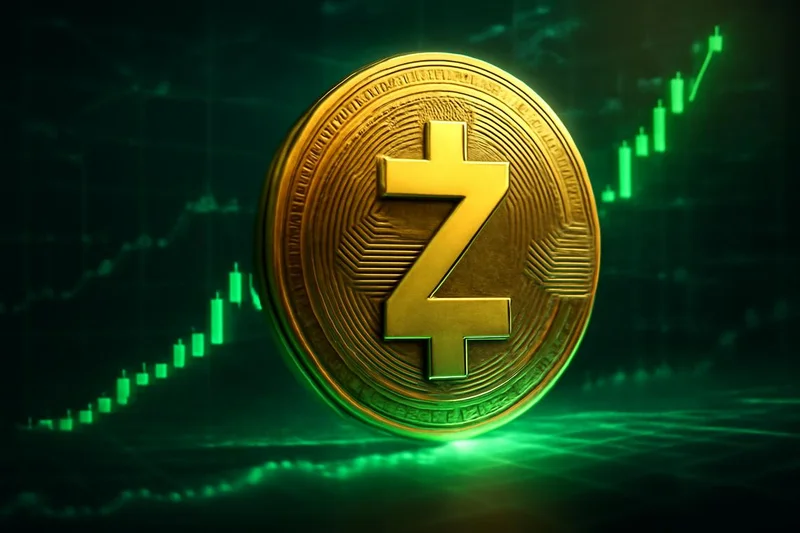Zcash's Privacy Pivot: Hype or Hedge Against Bitcoin's Transparency?
Zcash (ZEC) is making waves, surging 15x since September while Bitcoin stumbles. Cypherpunk Technologies (Nasdaq: CYPH) just doubled down, adding another $18 million worth of ZEC to its treasury. The question isn't whether Zcash is moving, it's why, and whether this rally has legs. The narrative hinges on privacy, but let's dissect the numbers behind the noise.
Decoding the ZEC Surge
Cypherpunk's investment is significant. They now hold 233,644.56 ZEC, representing 1.43% of the total supply. Valued at over $146 million, this isn’t a small bet. Their stock, CYPH, is up nearly 6% on the day and a staggering 469% over the last month. This mirrors Zcash's own ascent, recently trading at $626, a 125% jump in 30 days. But context is key.
Bitcoin, despite hitting record highs recently (above $126,000 in early October), has since plunged, dropping 12% in the last week alone. Zcash, meanwhile, jumped 31% in the same period. This divergence suggests a flight to perceived safety—or at least, a flight to something different. Is Zcash the new haven?
The argument boils down to privacy. As Galaxy Digital Research Analyst Will Owens notes, Bitcoin's transparency, amplified by ETFs, pushes some towards Zcash's "encrypted Bitcoin" appeal. It's a return to cypherpunk ideals amid growing on-chain surveillance. But is this a fundamental shift or just FOMO (fear of missing out) fueled by a compelling privacy thesis?
Here's the rub: Zcash has been around since 2016. What's changed now to justify this sudden surge? The article itself admits that "nothing fundamental has changed about ZCash in the past six months." This rally, by their own admission, is hype-driven. That doesn't make it invalid, but it demands scrutiny.
Privacy vs. Regulation: A Looming Showdown
Zcash's core value proposition – privacy through zero-knowledge proofs (zk-SNARKs) – is also its biggest liability. Regulators worldwide are cracking down on anti-money laundering (AML), and privacy coins are in the crosshairs. Delistings from centralized exchanges are already happening. Europe's new AML rules are pushing exchanges to remove coins they can't easily monitor. Zcash has already appeared on watchlists. (A parenthetical clarification: These watchlists are not suggestions to buy!)

This creates a precarious situation. Zcash's utility hinges on its ability to provide financial confidentiality. But if regulatory pressure forces exchanges to delist it, that utility diminishes drastically. It's a classic double-edged sword.
Dogecoin, the meme coin, is brought up as a comparison. Its infinite supply makes long-term price compounding difficult. Zcash, with its 21 million coin limit mirroring Bitcoin, theoretically avoids this trap. However, theory clashes with reality when regulators enter the equation. Scarcity means little if the asset becomes practically untradeable.
Here's the part I find genuinely puzzling: The Winklevoss twins are backing Cypherpunk Technologies’ Zcash treasury. These are the same guys who run Gemini, a regulated exchange. How do they reconcile supporting a privacy coin facing increasing regulatory scrutiny with running a platform that needs to comply with those same regulations? It's a contradiction that needs resolving.
The million-dollar question (pun intended) is whether Zcash can navigate this regulatory minefield. If it can appease global regulators, its scarcity and privacy features could justify a higher valuation. But that's a big "if." The risk is substantial.
A Hype-Fueled Gamble
Zcash's surge is driven by a potent combination of Bitcoin's perceived transparency and a growing desire for financial privacy. But the rally lacks a fundamental shift, relying instead on hype and FOMO. The regulatory headwinds are significant, potentially crippling its utility. Investing now is a gamble, not a calculated bet.
So, What's the Real Story?
Zcash might offer a compelling narrative, but the numbers suggest a hype-driven bubble waiting for a regulatory pin.


